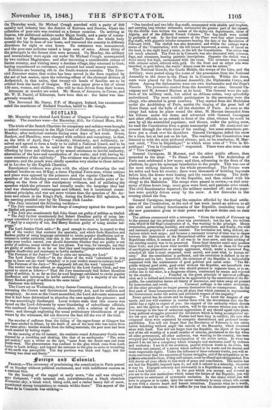SCOTLAND.
Mr. Macaulay was elected Lord Rector of Glasgow University on Wed- nesday. The numbers were—for Macaulay, 255; for Colonel /lure, 203.
The trials of the Scotch Chartists for conspiracy and sedition were brought to actual commencement in the High Court of Judiciary, at Edinburgh, on Monday, After technical contests during some days of last week. Grant, Ranken' and Hamilton, were charged with sedition and conspiracy, in that, on the 28th of April, they "wickedly, feloniously, and seditiously, re- solved and agreed to form a body to be called a National Guard, and to be provided with arms, to be used for the illegal and seditious purpose of effecting by force and violence, or by armed resistance to lawful authority, alterations of the laws and constitution of the realm; and with having be- come members of the said body." The evidence was that of policemen and reporters; and the proofs were chiefly speeches very similar to those deliver- ed in London by the English Chartists.
Exculpatory evidence was given with the object of throwing the real criminal burden on one M`Kay, a fierce Physical Force man, whose notions and plans were opposed by the prisoners and the regular Chartists. The speeches of the defending counsel were directed to the double point of in- sisting on the force of this exculpatory evidence, and of palliating the speeches which the prisoners had actually made: the language they had need was rhetorically extravagant and inflated, but it inculcated consti- tutional principles, and was not more violent than the speeches of Mr. Ay- toun and others in the King's Park, during the Reform Bill agitation, at the meeting presided over by Sir Thomas Dick Lauder.
The Jury returned the following verdicts- " The Jury unanimously find the charge of conspiracy against the three panels as libelled not proven.
"The Jury also unanimously find John Grant not guilty of sedition as libelled. "The Jury further unanimously find Robert Ramilton guilty of using lan- guage calculated to excite popular disaffection and resistance to lawful authority. 4! And by a majority of one, find Henry Rauken guilty of using similar Jan- ewe:, - Ile Lord Justice Clerk said—" Be good enough to observe, in regard to that part of the verdict that contains the specialty, and which finds Hamilton and &liken guilty of using language calculated to excite popular disaffection aud is sistance to lawful authority, that this is the description of sedition libelled. To make your verdict correct, you should determine whether they are guilty or not guilty of sedition, teeny extent that you please. You may, for example say they are guilty of sedition in so far as that they used language calculated to excite poplar disaffection and resistance to lawful authority."
The Foreman of the Jury—" That is quite our meaning, my Lord."
The Lord Justice Clerk—" In the choice of the word calculated,' do you mean to leave out the word 'intended,' or is your verdict meant to embrace both ?" The Foreman of the Jury—" We purposely left out the word 'intended.'"
The verdict was then altered as suggested by the Lord Justice Clerk, and was agreed to stand as follows—" That the Jury unanimously find Robert Hamilton guilty f sedition, in so far that he used language calculated to excite popular s as affection and resistance to lawful authority ; and by a majority of one find Henry Ranken guilty of sedition in the same terms." Sentence was deferred.
The Court sat on Wednesday, to try James Cumming, shoemaker, for con- travening the Crown and Government Security Act, and for sedition and conspiracy. As soon as the Court assembled, the Lord-Advocate announced that it had been determined to abandon the case against the prisoner; and he was accordingly discharged. Local writers state that this course was forced on the Lord-Advocate by some blundering of subordinate officials, who confused James Cumming, shoemaker, with a relation of the same name; and through neglecting the usual preliminary identification of pri- goners by the witnesses, did not discover the fact till the eve of the trial.
The number of sufferers from the falling of the sugar-house at Glasgow has now been swelled to fifteen, by the death of one of the men who was taken from the rains alive: besides wounds from the falling materials, the poor man had been much scalded by boiling sugar.
On the morning of the 3d instant, the residents round Achnacarry Castle were alarmed by a rambling and shaking, like that of an earthquake. "The noise and motion," says a writer on the spot, "came from the South-east and went North-west. The plemaomenon was confined to the glen which runs from Loch Lochy to Loch Arkaig; and beyond the entrance to the glen no noise or trembling of the earth was perceptible. The day previous was thick and foggy, but the morning was clear and frosty."


























 Previous page
Previous page